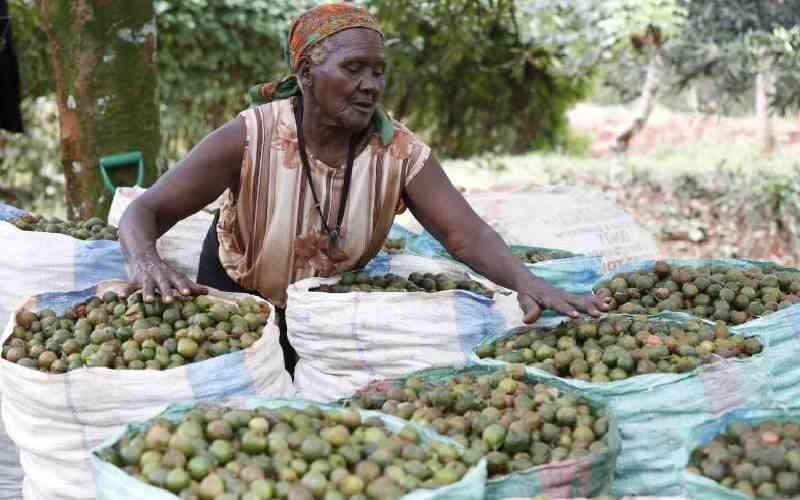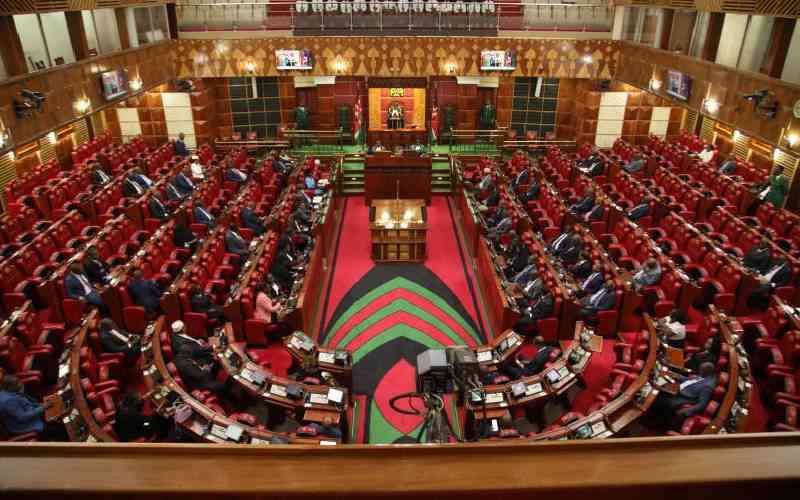
In his tiny partitioned office cum factory on the first floor of Ngara Shopping Complex, in Nairobi sits Jannes Otieno Ochieng, 28, with only a laptop on his desk and a few shoes samples.
Otieno’s entrepreneurship journey started way back when he was a second year university student at Kenya College of Accountancy in 2008, now KCA University - where he started an online market for electronics.
“I failed to pay the maintenance fee for the website and I had to close it down in 2011,” said Ochieng, the father of one boy aged four years.
He then secured an accounting, auditing and business advisory job at Kioko and Associates, the job that he did well, thanks to his experience in online marketing.
In 2014 while still doing advisory job, he ventured into shoe making business after he realised that 80 per cent of shoes worn in Kenya are imported yet the materials used to make them are locally available.
“I also realised that there is a market for shoes in Kenya whereby according to Kenya Bureau of Standards, annual demand stands at 24 to 32 million pairs, surpassing the current production capacity of four million pairs. The deficit is being filled by imports from countries such as China and Ethiopia,” Ochieng told Financial Standard.
Father’s business
Kenya is ranked as the second largest importer of shoes in Africa after Egypt.
Since his father used to make suits in Kapsabet, in Nandi County, he also saw it good to complement his father’s business by making shoes so that they can wholly dress up customers.
He met and befriended one David Odhiambo in Korogocho slums, who had worked in a local shoe manufacturing company for years as a designer. “I told him I want to start shoe making business and needed a designer, as I look for market,” said Ochieng, a last born in a family of six, born in Kapsabet but raised in Nyakach, Kisumu County.
Armed with only Sh40,000 as seed capital from his savings, he bought his initial sewing machine and materials and used the rest to pay rent expenses in a single room in Githurai 45. They moved to Ngara in a 10 by 18 feet size room in March this year.
The company started producing 40 pairs per month but now it does 180. The company deals in 14 models of shoes of various colours. They include formal school shoes with silica leather, loafers with premium refined leather, moccasins, sandals and half boots.
The prices range between Sh1,600 and Sh3,000. He sells about 100 pairs each month and on a good month, he can sell up to 350. The pairs come with a six-month warranty. “Our prices are the best unlike what is in the market,” says Ochieng.
Ochieng sources his leather from a factory in Thika, rubber products and soles from suppliers nearby. The work involves designing the prototype first, stitching, joining, skiving, lasting and finally branding with Bantu logo.
He says the market response has been good unlike in the initial stages, when there was mistrust among Kenyans about locally manufactured goods.
“The sales have increased because Kenyans are appreciating our genuine and long lasting shoes, thanks to our quality leather we use hence long lasting,” says Ochieng.
“Our income in 2015 was Sh80,000 but today we make Sh300,000 to Sh350,000 per month. More referrals from customers who have tried our shoes have also been useful.”
Facebook and Twitter
Ochieng also sells his shoes on social media sites such as Facebook and Twitter, among other platforms.
You just go online, identify the shoe type you want and request for the shoes after paying for it and we shall deliver them to you through courier services.
In Nairobi we charge nothing to deliver new purchases, but outside Nairobi we charge Sh200 for delivery services.
Despite the success story, Ochieng reckons that the venture does not lack challenges, just like any other business. Ochieng blames high taxes levied on raw materials such as leather as one of his biggest challenges.
“Why should we pay VAT on raw materials yet shoes imported are subsidised... Ethiopia leather is cheaper and does not attract duties, making it hard for us to compete with their imports. ”
He says VAT has increased the cost of production, which forced him to pass it on to his consumers.
“I am however hopeful that with the establishment of a leather park, it will contribute to reducing the cost of inputs like leather and make us competitive,” said Ochieng.
He also cites limited varieties of locally made soles, hence confining them to making few shoes varieties and forcing them to import alternative range at higher cost.
Ochieng also cites influx of cheaper and non-durable imported shoes from China and Ethiopia as a big challenge. The company sells the bulk of its goods within Nairobi and about 10 per cent is shipped to counties outside Nairobi.
He says they are in talks with distributors around the country to stock their shoes so as to reach other major towns.
He appreciates the Buy Kenya Build Kenya initiative, which is working to his advantage.
“Initially, Kenyans though that anything made locally is of poor quality and not long lasting, but I am happy that Kenyans are slowly appreciating their homegrown products thus keeping us going on,” said Ochieng, who has now employed seven staff members, mostly youth who deal in production and sales.
In five years, Bantu Company plans to reach a level where potential buyers will be able to go to its factory or select the available collections online.
Equipment upgrade
He also plans to buy modern machines to enable larger quantity produced, unlike now when most of the work is done manually.
“Today, a pair of shoes to be ready takes us about two hours before it’s ready for the market, but once we get the computerised skiving, stitching, lasting, pressing machines , we will be able to produce a pair of shoes within minutes,” Ochieng.
The firm also replaces the damaged soles. Ochieng was among the 75 Kenyans selected for the 2016 Tony Elumelu Entrepreneurship Programme of the first cohort of 1,000 entrepreneurs from 51 African countries.
 The Standard Group Plc is a multi-media organization with investments in media
platforms spanning newspaper print operations, television, radio broadcasting,
digital and online services. The Standard Group is recognized as a leading
multi-media house in Kenya with a key influence in matters of national and
international interest.
The Standard Group Plc is a multi-media organization with investments in media
platforms spanning newspaper print operations, television, radio broadcasting,
digital and online services. The Standard Group is recognized as a leading
multi-media house in Kenya with a key influence in matters of national and
international interest.
 The Standard Group Plc is a multi-media organization with investments in media
platforms spanning newspaper print operations, television, radio broadcasting,
digital and online services. The Standard Group is recognized as a leading
multi-media house in Kenya with a key influence in matters of national and
international interest.
The Standard Group Plc is a multi-media organization with investments in media
platforms spanning newspaper print operations, television, radio broadcasting,
digital and online services. The Standard Group is recognized as a leading
multi-media house in Kenya with a key influence in matters of national and
international interest.










